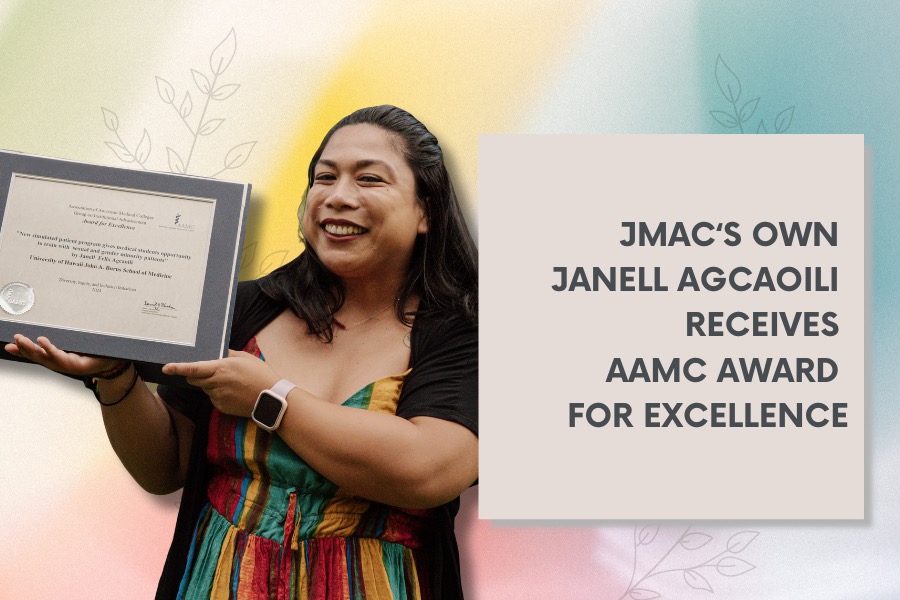Social & Emerging Media Strategist Janell Felix Agcaoili put the John A. Burns School of Medicine on the national map with her exceptional reporting on a novel, student-led program that trains future physicians to interact compassionately with sexual and gender minority patients. Her article secured a competitive Association of American Medical Colleges (AAMC) GIA Award for Excellence. These awards honor the most creative and effective approaches used to promote academic medicine through alumni relations, communications, development, marketing, and public affairs/community relations programs and projects.
“As an ally of the LGBTQIA community, it was my pleasure to write this article on the MD 2024 class at JABSOM and their simulated patient program for sexual and gender minority (SGM) patients. It is amazing to see JABSOM’s future doctors think about the care, compassion, and kindness SGM patients need in a world where so many of them, especially in healthcare, feel so unsafe,” said Agcaoili. "Never in a million years could I have predicted winning a national award for a body of work that was mine.”
In 2022, Agcaoili interviewed Dr. Danielle Sato, who was a JABSOM medical student at the time, and learned of the medical trauma experienced in healthcare settings by many LGBTQ+ patients. Sato and two other students at the time, now Drs. Lauren Mooney and Melia Takakusagi, spearheaded the Sexual and Gender Minority Simulated Patient Experience Project in December 2022. Since then, the program has continued, led by incoming 4th year medical student and president of the Medical Student Pride Alliance, Madeleine Chai, and incoming 3rd year student Richard Chen. Advisor, Dr. Dee-Ann Carpenter continues to recruit faculty who will observe and give feedback to students. The simulated patient program for SGM patients has also been moved toward the beginning of the year so students can use the information to talk to their patients throughout their clinical year.
Read Agcaoili’s award-winning article in full.

As a woman, Agcaoili said that she sometimes feels apprehensive about going to a doctor in fear of being misheard or mistreated. Knowing that these fears may be amplified in the shoes of SGM patients and that they have historically endured negative health care experiences stirred Agcaoili to write about the groundbreaking program. In reporting, she hoped that she could make a positive difference in the lives of those who may live in fear or apprehension of seeking help due to their sexual/gender identity.
“It's not new to have people who identify as sexual and gender minorities. But because there are so many people that are now identifying as trans or non-binary, this kind of practice (the simulated SGM program) will help them to not be harmed or treated unjustly in other places… and in other aspects of their lives. You know, if you start with one place, like a physician’s office or the hospital, where sexual and gender minorities are treated fairly and justly, then hopefully they will be treated without harm in other places as well,” Agcaoil said.
The article, “New simulated patient program gives medical students opportunity to train with sexual and gender minority patients” was recognized with the Silver Award for Excellence in the Diversity, Equity and Inclusion Initiatives category. One of the comments from an anonymous judge in the peer-reviewed process states:
“This is very timely since LGBTQ+ individuals are having their rights threatened daily. Discrimination, stigma, and violence, along with other social, political, and economic factors, significantly affect the physical, mental, and behavioral health of transgender adults. Having medical students train with sexual and gender minorities is a great concept. Kudos to the University of Hawaiʻi John A. Burns School of Medicine.''
For Agcaoili, she is just glad to be able to tell this valuable story.
“You don't know what impact you have until you do it,” Agcaoili said. “Everything that I put into my work, I do it because I feel like the story needs to be told and even if it reaches only three people, if it reaches the whole state of Hawaiʻi or if it reaches all of the people reading AAMC content– it doesn't matter who the audience is. If it's important to me, I will tell the story. That's the message, to share what JABSOM is doing here and why the school feels it's important.”